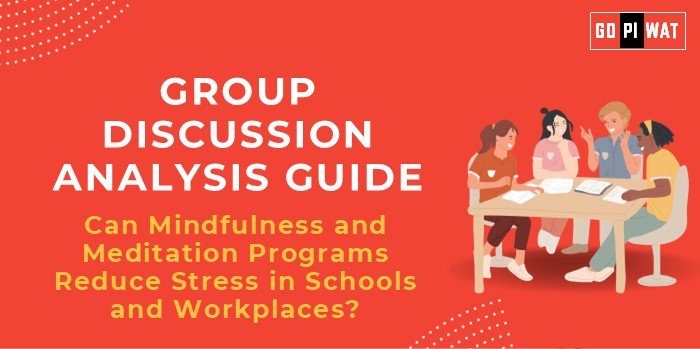📋 Group Discussion Analysis Guide: Can Mindfulness and Meditation Programs Reduce Stress in Schools and Workplaces?
🌐 Introduction to the Topic
Opening Context:
Stress-related issues in schools and workplaces contribute significantly to absenteeism, reduced productivity, and mental health concerns. With increasing attention on holistic well-being, mindfulness and meditation programs have emerged as potential solutions.
Topic Background:
Rooted in ancient practices, mindfulness and meditation are gaining global attention as scientifically supported methods for stress reduction. Various studies and pilot programs have demonstrated their benefits, prompting their integration into institutional policies worldwide.
📊 Quick Facts and Key Statistics
- 🌍 Global Workplace Stress: 43% of employees globally experience work-related stress (Gallup, 2023).
- 📚 Student Stress Levels: 45% of students report stress as a primary barrier to academic performance (American Psychological Association, 2023).
- 🧘 Mindfulness Effectiveness: Mindfulness practices can reduce stress by up to 38% in workplace settings (Journal of Occupational Health, 2023).
- 🏢 Adoption Rate: 25% of Fortune 500 companies have implemented mindfulness programs (Forbes, 2024).
👥 Stakeholders and Their Roles
- 🏫 Schools and Universities: Implement structured mindfulness programs to improve student focus and emotional regulation.
- 🏢 Employers and HR Teams: Integrate mindfulness training into wellness initiatives to boost employee productivity and retention.
- 🩺 Health Professionals: Advocate for and design evidence-based interventions.
- 🏛️ Government Bodies: Provide funding and policy support for mental health programs.
🏆 Achievements and Challenges
✨ Achievements:
- 📚 Improved Academic Performance: Mindfulness training enhanced focus and resilience in students, as seen in California’s Quiet Time Program.
- 📈 Workplace Productivity Gains: Companies like Google report higher employee engagement through mindfulness initiatives.
- 🧠 Mental Health Benefits: Reduced symptoms of anxiety and depression among participants.
⚠️ Challenges:
- 💭 Implementation Barriers: Resistance due to stigma around mental health practices.
- 🏗️ Scalability Issues: Lack of trained professionals and funding for widespread adoption.
🌍 Global Comparisons:
- 🇬🇧 The UK: The Mindfulness in Schools Project sets a benchmark.
- 🇯🇵 Japan: Integrates Zen-inspired practices in workplaces.
📚 Case Study:
- 🇮🇳 India’s Telangana State: Piloted mindfulness programs in schools, resulting in a 25% decrease in stress-related absenteeism.
💬 Structured Arguments for Discussion
- ✔️ Supporting Stance: “Mindfulness programs scientifically improve focus and reduce stress, as evidenced by corporate and academic success stories.”
- ❌ Opposing Stance: “Cultural stigma and logistical challenges hinder the widespread adoption of such programs.”
- 🔄 Balanced Perspective: “While mindfulness programs show promising results, their impact depends on strategic implementation and cultural adaptability.”
🎯 Effective Discussion Approaches
🚀 Opening Approaches:
- 📊 Highlight Statistics: “43% of employees globally experience work-related stress—mindfulness could be a game-changer.”
- 📚 Global Success Stories: Introduce examples like Google’s mindfulness program.
💡 Counter-Argument Handling:
- ✔️ Data Support: Use statistics and case studies to challenge skepticism about effectiveness or feasibility.
- 📈 Solutions: Highlight the role of government funding and digital platforms in scaling mindfulness programs.
🔍 Strategic Analysis of Strengths and Weaknesses
- 💪 Strengths: Scientifically proven benefits, cost-effectiveness, and versatility across sectors.
- ⚖️ Weaknesses: Limited accessibility, potential resistance, and lack of immediate results.
- 🌱 Opportunities: Integration with digital platforms and apps.
- ⚠️ Threats: Misconceptions about mindfulness and inconsistent program quality.
🎓 Connecting with B-School Applications
🌐 Real-World Applications:
- 📈 Integrating mindfulness in leadership training and stress management workshops.
- 💻 Leveraging digital platforms to scale mindfulness programs.
🤔 Sample Interview Questions:
- ❓ “How can mindfulness programs improve organizational performance?”
- ❓ “What are the challenges in implementing such programs?”
💡 Insights for Students:
- 🔍 Develop a nuanced understanding of mental health’s impact on productivity and leadership.
- 📊 Explore innovative approaches to scaling mindfulness initiatives in organizations.


